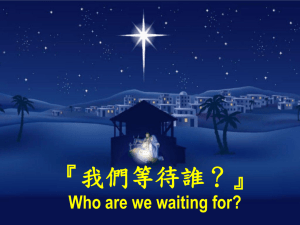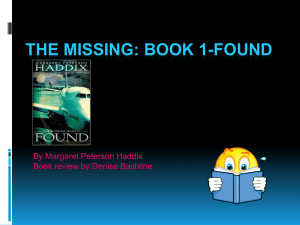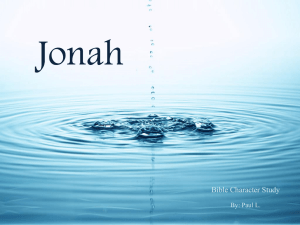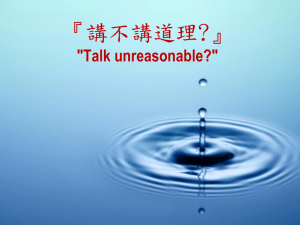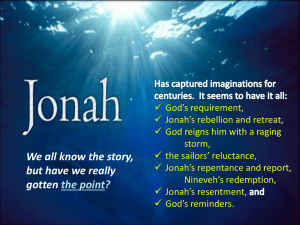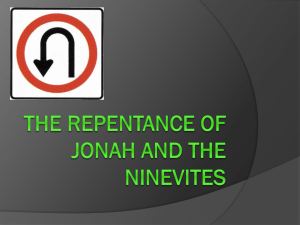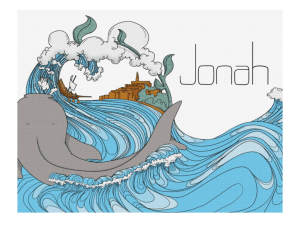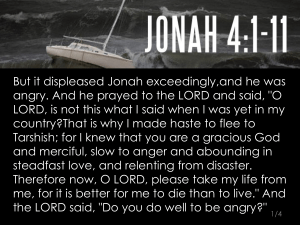jonah
advertisement
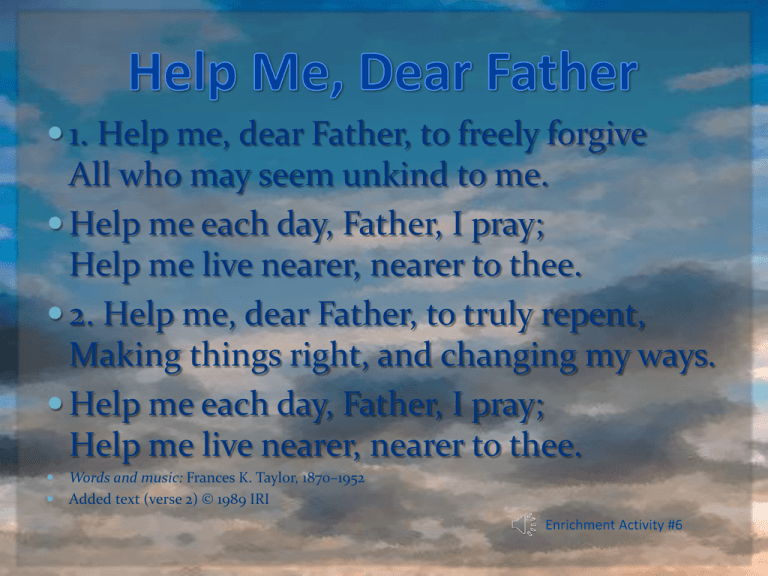
1. Help me, dear Father, to freely forgive All who may seem unkind to me. Help me each day, Father, I pray; Help me live nearer, nearer to thee. 2. Help me, dear Father, to truly repent, Making things right, and changing my ways. Help me each day, Father, I pray; Help me live nearer, nearer to thee. Words and music: Frances K. Taylor, 1870–1952 Added text (verse 2) © 1989 IRI Enrichment Activity #6 “Lesson 43: Jonah and the People of Nineveh,” Primary 6: Old Testament, (1996),189 Solve this maze by looking only at it’s reflection in the mirror. Draw a line through the maze beginning at Start and ending with Nineveh. If you make a wrong turn, you may back up in the maze and turn another direction. You should only look at the maze’s reflection in the mirror. Jonah was a prophet of God. God told him to go to a city called Nineveh. The people there were wicked. God told Jonah to tell the people to repent. Jonah did not obey God. Jonah did not want to go to Nineveh. He did not want to tell the people to repent. He got on a ship. The ship was sailing to another city. God sent a bad storm. The wind blew hard. The men on the ship were afraid it would sink. The captain of the ship went to Jonah. Jonah was sleeping. The captain woke him. He told Jonah to pray and ask God to help them. The men thought the storm came because Jonah was on the ship. They wanted the storm to stop. They asked Jonah what they should do. Jonah told them to throw him into the water. He knew God sent the storm because of him. He had not obeyed God. The men did not want to throw Jonah into the water. But they knew the storm would stop if they did. So they threw him into the water. The storm stopped. God sent a big fish. The fish swallowed Jonah. Jonah was in the fish for three days and three nights. Jonah prayed to God. He repented. He said he was sorry he had run away. He promised to obey God. The fish put Jonah out on dry land. Again God told Jonah to go to Nineveh. He said to tell the people to repent. This time Jonah obeyed God. He went to Nineveh and told the people to repent. If they would not repent, Nineveh would be destroyed. The people repented and stopped being wicked. They fasted and prayed. God did not destroy Nineveh. Why did the Lord want Jonah to go to Nineveh? Let’s read Jonah 1:2 The people of Nineveh were not Israelites and therefore were not part of the covenant people; why would the Lord send Jonah to preach repentance to them? Those people who are part of the house of Israel have the responsibility to take the gospel to those who are not part of the covenant people. Heavenly Father loves all his children and wants them all to be worthy to come back into his presence. What can repentance do for us? Tie your ankles together and try to step up on this step stool without jumping or hopping. Enrichment Activity #1 Let’s read D&C 88:86 Mistakes and wrongdoings can be compared to the rope. They limit us and keep us from progressing, or climbing, toward Heavenly Father’s kingdom. They also prevent us from being as happy as we would have been if we had not sinned. Enrichment Activity #1 What can we do to untie the ropes of our wrongdoings? Because of the Atonement, we can repent, overcome our mistakes, and be forgiven. Repentance is similar to untying the rope. We are free from the errors that bring us unhappiness and are able to progress toward being worthy of living with Heavenly Father. Enrichment Activity #1 Where did Jonah go instead of going to Nineveh? Let’s read Jonah 1:3 Why is it impossible to flee from the presence of the Lord? Why do you think someone might want to flee from the Lord’s presence? When the Lord caused a great wind to blow, what did the shipmaster want Jonah to do? Let’s read Jonah 1:6 What did Jonah want the mariners to do with him to stop the tempest? Let’s read Jonah 1:11–12 When the men were reluctant to throw Jonah into the sea, what did they do to try to save the ship? Let’s read Jonah 1:13 How long was Jonah in the belly of the great fish? Let’s read Jonah 1:17 What did Jonah do while he was in the fish? Let’s read Jonah 2:1–2 How did the Lord answer Jonah’s prayer? Let’s read Jonah 2:10 What did Jonah do that showed he was repenting? Let’s read Jonah 2:1; 3:1–4 What did the people of Nineveh do when they heard Jonah? Let’s read Jonah 3:5–8 Sackcloth was a coarse, dark cloth made of the hair of camels and goats. This cloth was made into rough garments for people to wear as a symbol of sorrow and mourning. What did the people of Nineveh do to repent? They recognized they had been doing wrong, prayed to God, and turned away from their evil practices. Who needs to repent? How do we know when we need to repent? Who made it possible for us to repent and be forgiven? When we left Heavenly Father to come to the earth, we were pure and did not have any sins. Enrichment Activity #2 Heavenly Father knew that we would not remain pure but would make mistakes as we grew and learned. Enrichment Activity #2 Because of his love for us, Jesus Christ suffered for our sins, making it possible for us to be forgiven through repentance. Enrichment Activity #2 These are baby pictures of some of the people in our class. Try to figure out who is in each picture! Enrichment Activity #2 Why is it important that we repent of our sins? Let’s read D&C 1:31–33 We cannot enter Heavenly Father’s presence unless we repent of our sins. What do we need to do to repent? Recognize our sin Feel bad about it Ask forgiveness Do what we can to make restitution Never do it again! What does the Lord promise to do if we repent? Let’s read D&C 58:42 1 3 4 5 8 10 13 14 The numbered squares go in a horizontal row. The class is divided into two teams. The object of the game is to get three fish or three boats in a row. As each team answers a question correctly, they put one of their team’s cards on a number… Enrichment Activity #3 1 3 4 5 8 10 13 14 Only one card may be placed on a number. Sometimes teams will have to decide whether to block the other team or go for the win themselves. If no team gets three in a row before all the numbers are covered, the team with the most fish or boats is the winner! Enrichment Activity #3 What are some examples of this? Enrichment Activity #4 Some other examples are: You see someone hurting a child, and you do nothing about it. You know the gospel is true, but you never try to share it with nonmembers. You do not go to church on Sunday… Enrichment Activity #4 Your parents have made great sacrifices to pay for your education, but you do not study. A widow you know is lonely, but you never visit her. You forget to be thankful when things are done for you. Enrichment Activity #4 Let’s read D&C 58:42–43 42 Behold, he who has repented of his sins, the same is forgiven, and I, the Lord, remember them no more. 43 By this ye may know if a man repenteth of his sins—behold, he will confess them and forsake them. Read the verses again to yourself and choose what you think are four of the most important words in each verse. Enrichment Activity #5 Which words did you choose and why are they important? Let’s memorize these verses! D&C 58: 42 Behold, he who has repented of his sins, the same is forgiven, and I, the Lord, remember them no more. 43 By this ye may know if a man repenteth of his sins—behold, he will confess them and forsake them. Enrichment Activity #5 I testify that Christ has made it possible for us to be forgiven of our sins through the Atonement. I know that Heavenly Father will gladly forgive all who truly repent. I am grateful for the great gift of repentance, and know how important it is that we all take advantage of this gift. This painting is What Our Lord Saw from the Cross by James Tissot. I know he loves each and every one of us. I am grateful for the sacrifice he made for all of us. Images and clipart are from lds.org, sugardoodle.net, Microsoft Office, and other websites indicating the images were in the public domain. The hymn, lesson and scripture story are from lds.org Please do not use this presentation for commercial use. Feel free to alter the presentation for use in church or home to suit personal preference. This presentation is intended to supplement, not replace, the lesson manual and scriptures. Teachers should refer to the manual, scriptures and other resources when preparing and conducting the lesson.
